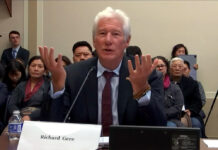
(TibetanReview.net, Feb14, 2018) – A total of 117 Tibetans living in Tibet and in exile have on Jan 11 written a joint online appeal to the Supreme Court of China, expressing concern at the failure of relevant regional courts to use the Tibetan language, which they have said contravened the Chinese Constitution. The appeal, with the names and personal descriptions of the signatories, is published on the Tibetan-language website Trimleng, a discussion forum especially on legal and policy issues affecting Tibetans in Tibet, said Washington-based International Campaign for Tibet Feb 12.
Chinese authorities are hardly known to heed public petitions, especially from ethnic minorities who get accused of engaging in ethnic extremism and local nationalism whenever they take up any issue concerned with their supposedly constitutionally guaranteed cultural, linguistic, and religious rights and the right to autonomy.
ICT has noted that the appeal was also a carefully-worded expression of support for Tibetan businessman and shopkeeper Tashi Wangchuk of Yulshul (Chinese: Yushu) Prefecture in Qinghai Province. He was arrested in Jan 2016 after the New York Times released a video report profiling his efforts to request additional Tibetan language classes at schools in his home area. He was tried for “incitement of separation” for this alleged crime on Jan 4 and awaits the verdict on it. If convicted he could be jailed for up to 15 years.
More recently, a group of 15 internationally known unnamed scholars and professors on Tibet, from France, the UK, US, Czech Republic, Canada and Australia called for clemency for Tashi Wangchuk in a letter published in the South China Morning Post, Hong Kong, on Feb 8.It followed expressions of concern and support for Tashi Wangchuk from German and Latvian Parliamentarians, and an Urgency Resolution by the European Parliament.
The online Tibetan letter was quoted as saying, “The failure to use the Tibetan language by the People’s courts at various Tibetan autonomous levels violates the obligation for autonomous regions to use the Tibetan language in their offices as laid out in the Constitution of the country, the Regional Ethnic Autonomy Law, regulations on learning and use of the Tibetan language by the Tibet Autonomous Region, and regulations of the ten Tibetan Autonomous Prefectures on the issue of Tibetan language.”
In concurrence with the letter published in the South China Morning Post, the scholars have pointed out what China’s Constitution states: that “all nationalities have the freedom to use and develop their own spoken and written languages.”
The Tibetan appeal letter was also quoted as pointing out: “By merely voicing his opinion that the judicial and administrative offices like the Yulshul People’s Court and government are not using Tibetan, Tashi Wangchuk has been arrested by judicial office and levelled charges. However, there is not a single Tibetan word on the websites of the of the Intermediate People’s Court and the government of the Yulshul Tibetan Autonomous Prefecture.”
Ninety percent of the signatories to the Trimleng appeal letter were stated to be from the traditional Tibetan province of Amdo, with the remaining 10 percent being from Kham.
On Feb11, China’s official globaltimes.cn reported that the public security Bureau of Tibet Autonomous Region had released a circular listing 22 illegal activities it wanted people to report. It was stated to have come after the Communist Party of China Central Committee and the State Council in January announced a renewed effort to fight organized crime and officials who shelter criminal organizations.
In this connection, the report cited Wang Xiaobin, a scholar at the Beijing-based China Tibetology Research Center, as saying “hostile forces” and some intellectuals who advocate “protecting the local language” were attempting to spread that he has called the false notion that the Chinese language is destroying Tibetan culture.
The campaign’s sweeping reach is said to target “gangsters who threaten political stability and infiltrate politics, or encourage the public to go against the Party and government under the disguise of religion, or prompting ethnic extremism”.





